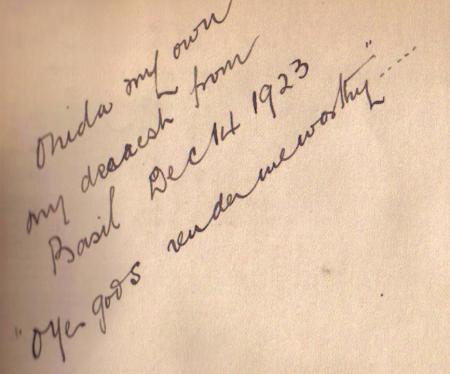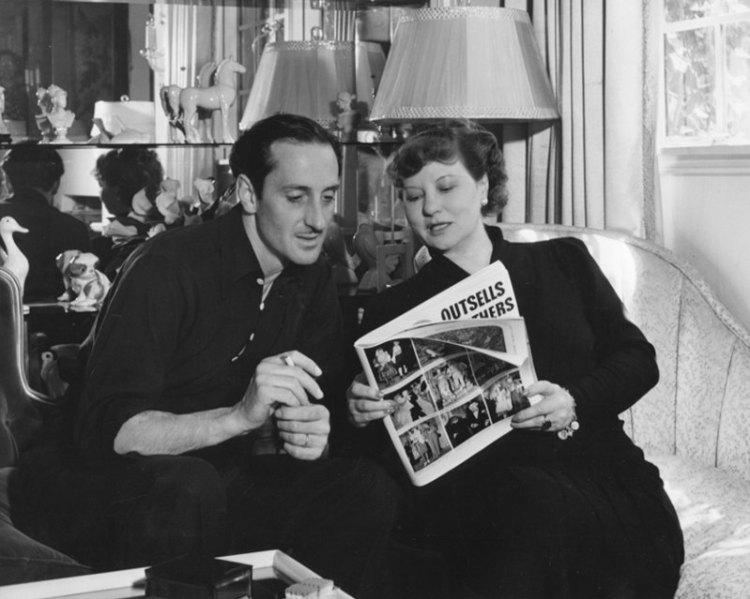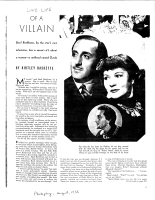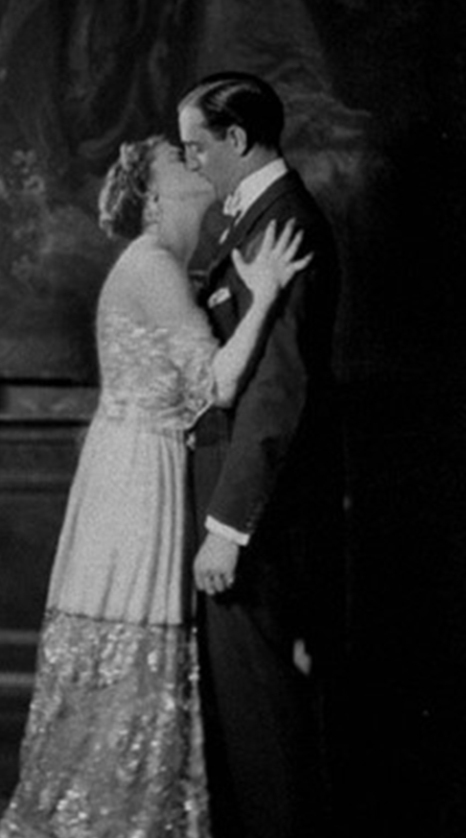How much Basil Rathbone knew about his second wife’s past is debatable. Some of the things he said about her in public suggest she might have been keeping certain things from him. For example he said in one magazine interview that he’d been unsure when he first got to know her whether Ouida believed in divorce or if she would be willing to dissolve her marriage to Fitzmaurice in order to wed him – (True Story, 1940) which makes pretty much no sense if he’d known she’d been married and divorced at least once previously.
So, it may be he never knew about Mr Burgess in Little Rock.
Or about Little Rock at all.
Or about Mr Weadock – if indeed she ever married a man by that name.
Or even about Eula/Eunie Branch.
He generally puts over the image of Ouida as a very morally upright woman with strong religious convictions, who was keen to be married in a church and even refused to stay in the same hotel with him until they were legally married.
Does this totally jibe with Eula/Eunie, married at nineteen, divorced by 24, married once or twice more before she was forty and with a “niece’ in tow whose precise parentage remains to date obscure?
I’m not sure it does. I’m not sure this isn’t an invented set of moral principles to go with her invented history. Ouida Bergere, the exotic European lady who spoke only the “Spanish language” until she was four and who believed in the sanctity of wedding vows and no sex before marriage.
Maybe she intuitively sensed the rather lost, vulnerable, romantic and gentle young Rathbone would respond well to this suggestion she was an old-school virtuous woman, alone and in need of protection. So she simply turned on what he wanted to see.
If so, he bought it one hundred per cent. And his attitude to her from the outset seems to have been a bit like a knight of old pursuing the favor of a chaste demoiselle. At least that’s the impression given by many of the things he said subsequently, and by the dedication written to her not long after they first met…
You’ve gotta play the odds and assume no one had ever talked to short, chubby average-looking, averagely-talented Eunie Branch quite like that before. And almost certainly not a man who looked like young Basil Rathbone, romantic matinee idol. Did she realize how insanely above her weight she was punching? Or did she just think “finally, someone who gets how freakin’ great I am”?
And did he ever get to know about Mr Burgess? or Little Rock? Or Eunie/Eula? or did he go to his grave thinking her real name was Ouida and her first hubbie had been George Fitzmaurice?
In the summer of 1947, twenty-four years after her husband-to-be had written that inscription, exiled from Hollywood, and not having written anything professionally for (what a coincidence)twenty-four years, Ouida Rathbone suddenly decided her talent was needed to "improve" the play (THE HEIRESS) her husband had been asked to star in.
Even if she had been a successful playwright herself this is a massively inappropriate thing to do. But bearing in mind Ouida had never had a play produced professionally at all, this was not just boundary-deficient and presumptuous, it was also slightly insane.
But, rather than do the only self-protecting, sensible thing and tell her to back off before she wrecked his chance of a great part, Basil inexplicably humored her mad idea, and invited the director, Jed Harris and the authors, Ruth and Augustus Goetz, round to his apartment to listen to her read out her suggested rewrites from "piles of yellow paper."
Harris recorded his impression of the whole, awful, embarrassing thing. Ouida sat there – reading aloud – while the authors and the director looked on in silent disbelief, and Basil "leaned forward in a Hamlet-like attitude." When Ouida said “you are free to use anything I’ve written,” Basil jumped in to say "yes perhaps it would be better that way." pretty obviously as a means of drawing things to a close as quickly as possible. And everyone went home.
Ouida’s rewrites were never used, or even discussed again so far as we know.
Why had Rathbone done this? Why had he (presumably at her prompting) invited Harris and the Goetzes to come round? Why allow his wife to put him through the excruciating embarrassment of seeming to condone her weird and antisocial behavior?
What makes this even weirder is, according to Jed Harris, Rathbone never made Ouida’s rewrites a stipulation in his contract. He just turned up in Harris's office the next day, and signed the contract without saying a word more about those embarrassing yellow pages. So, this is less about Ouida throwing her weight about and controlling him than it is Basil humouring her for a moment and then moving on. I think we have to see that embarrassing scene in the apartment as simply for Ouida's benefit, to give her the impression she was being consulted. Basil was evidently going along with a sort of charade, to make her feel good about herself, or to feed some delusion that she was "helping" his career.
Hold on to that thought and journey back with me another nine years to 1938.
Around that time Ouida had apparently gotten it into her head she was going back into screenwriting as a career. Even if she had been as talented as she liked to make out, this was a totally unrealistic proposition given the fact she hadn't worked in the industry for fifteen years and had never worked on a talking filmat all. Given the previously stated fact that she just wasn't a very good writer, her hopes of “going back to work” were borderline delusional.
But then Ouida seems to have specialized in delusional thinking, and this was just the latest example.
Basil valiantly went in to bat for her on this occasion, just as he would nine years later in New York. He gave an interview for Photoplay in March 1938 that pretty much set out the story Ouida presumably wanted to be seen as "the truth" at that time…
“My wife was Ouida Bergere before we were married. She was a successful screen writer. Paramount was paying her thousands of dollars a week so I think you might say she was well along in her career. The day she married me she quit writing, abandoned her career. Or rather changed it. For twelve years, Ouida’s career has been – me…..
….She was a practical woman then, as she is now. She knew first that there should be only one pay check in a family. Two pay checks mean two separate lives. If she continued her work she would have had to be in Hollywood, while my interests were still on the stage in New York. She said, ‘If you are very much in love with something, you must be with it. I can’t write in Hollywood when you are in New York. So I won’t write!…
..rightly or wrongly, Ouida considers her job with me done now. She thinks I am established at last and capable of looking after myself. She feels she can relax now and return to writing, the career she abandoned to see me through. And it was she who saw me through – because, if I hadn’t met my wife, I honestly don’t know what would have happened to me, for until then my life had no direction…..”
This is a lot of self-abasement. And a great deal of it is hard to reconcile with verifiable reality. In fact the image he puts over of himself as a hopeless loser and Ouida as a dynamic success at the time they met is almost the reverse of the truth. In 1923, when he first spoke to her at a party, he was a star on the London stage and a huge hit on Broadway where he was playing with Eva Le Gallienne in THE SWAN, whereas Ouida had already finished her last screenplay and was effectively done in Hollywood.
The story being sold in this article is a “Ouida-reality” from the same alternative dimension where she gets to have been born on a train bound for Madrid and to have spoken only the “Spanish language” until she was four. It doesn’t even make any sense on its own terms. I mean if she really had given up work because she knew “two pay checks meant two separate lives” – then why was she planning to start working again?
But what makes it more interesting to us, is that this is Basil talking, not Ouida, and he is going along with her reinvention, following her script – to the point of undermining his own career and his own character – just to big up his wife in the press. Even though this narrative was a travesty of the truth and had the effect, not just of promoting Ouida, but of devaluing him almost to negation – making him no more than the sum total of Ouida’s self-sacrificing bid to turn him into a real human being – Rathbone adopted it unreservedly, and hammered the point home over and over "eagerly and humbly" as the slightly bemused journalist remarked. Just as in 1947 and THE HEIRESS debacle he’s helping her live a little dream of what she wants to be, at the expense of truth, sense, and even his own personal and professional pride. He’s there outside the tent she’s pitched, shilling for her, selling an image of her as she wanted to think she was – dynamic, successful, multi-talented, a Godsend to the man she married.
Is this weakness? Or something else?
The unidentified actress I quoted a while back on this blog said, memorably – “she didn’t take the power, he gave it to her.”
“…He was a much stronger person, a much more grown up person than she was. He was gentle, he rarely got mad – but he could – he really really could believe me. He was gentle but he was a very strong presence, very commanding and –don’t fuck with me – and you couldn’t screw with him unless he wanted to let you. I couldn’t. He wouldn’t take anything like that from me or from anyone but her…”
Why did he feel the need to do that? What was driving him to that kind of extreme? Is this “love”? Or something more like paying off a debt he thought he owed her? Was he still struggling to be “worthy” even after she’d wrecked his finances, forced him to whore himself out in order to pay the family bills, and pretty much destroyed his professional self-respect?
If that’s true – then why?
I think that question is beyond the scope of this blog. That is for a biographer to try and answer.
And thus ends the fourth and last part of our Ouida Series.






Buy game accounts cheap
LikeLike
Pingback: Writer and Wife | The Baz
As a lifelong admired of Basil Rathbone I really hate to think of him being victimized wife with a pathological tendency to self-aggrandizement, even though he appears to have been a willing victim. I’m sorry he never got the sort of recognition and respect his tremendous talent should have earned him. I never miss one of his movies on TCM when they show up, and even though he wasn’t proud of his Holmes work, I freely admit that I have the entire series on DVD, both the two period films and the Universal series. Good night, sweet prince.
LikeLike
Well, everyone may write me down as a materialistic old fogey ( and I am willing to shoulder the assignment) , but I have never managed to work out how Ouida ” made a go of things” after Basil died. Did she really live in a comfortable , well-furnished apartment in Manhattan, dress fashionably, and continue her movement in the social whirl? How in the 1960’s and 70’s inflation was this possible – could even be remotely possible ! for an elderly woman whose inheritance was only $10,000. Basil was my idol among actors and his life’s end was a heartbreak .
Will all members of this site please be assured that I mean no disrespect and am not engaging in gallows mockery when I speculate upon how this woman survived( and seems to have survived his passing and the ensuing years of her life) in some genuine comfort and social affluence.The list of actors and actors who ended their mortal stretches in the east/west coast custodial homes for the theatrical aged and infirm is impressively long and , to me , frightening, but I think this list is a part of American history and one that should be read and studied not only by young men and women contemplating a career in acting but also by fans and the public at large. I can only surmise that the Rathbone kept a large life insurance policy , but if one factors her habits of spending,I don’t see how they could have managed premiums.
If this biography has a mystery to tell , then her widowed survival is that very mystery.
LikeLiked by 1 person
Interesting comments, which certainly bear scrutiny. Thought I read that friends of BR (or of OB, if she had any) contributed money to help her toward the end because she was broke. I wonder when it began that actors started to collect royalties for their old movies as TV began depending more and more on filling airspace with them. Did actors who continued to pay their acting dues benefit from some sort of death benefit for survivors? Did she have some sort of deal on one of those prewar rent-controlled apartments? Did some rich friend pay the rent? So far as comments BR made about her in 1940s magazines, most of that stuff came from public relations types and can’t be relied on, and also he was a private man who would want to protect his and her privacy above all things. Which is probably the hold she had on him to prevent a divorce!!
LikeLike
This was in bestofreddit.com right?
LikeLike
whoah this blog is excellent i love reading your posts.
LikeLike
Humm my coment of the other night got gobbled up by the inernet gobblins again..oh well. Marcia just said what I wrote in case it shows back up at some time or another.
LikeLike
You know just giveing it some thought here, I know Basil never became an American citizen..but he did live in America,most of his adult life,wonder if that,might have had any bearing on it,of course I’m trying to 2nd guess The Queen,and her father.Probly not a great idea. >^..^<
LikeLike
It might also be due to the Rathbone family politics that he was never knighted. His family were compassionate radicals for generations. His cousin Eleanor Rathbone was an Independent MP and espouser of the poor and marginalizsed as well as women’s suffrage. His other cousin was a Marxist! It might be the English establishment didn’t like the family.
I have wondered about Basil and Joe McCarthy on account of his family connections. Was he grey-listed in the 1950s?
LikeLike
P.S.— I’ve read conflicting statements on whether or NOT Basil was ACTUALLY knighted, so it may not be TRUE…but, I’d like to THINK so! After all, who else on EARTH (besides Sir Christopher Lee) better deserves knighthood??
LikeLike
Basil definitely deserved to be knighted, but alas, it never happened. 😦
LikeLike